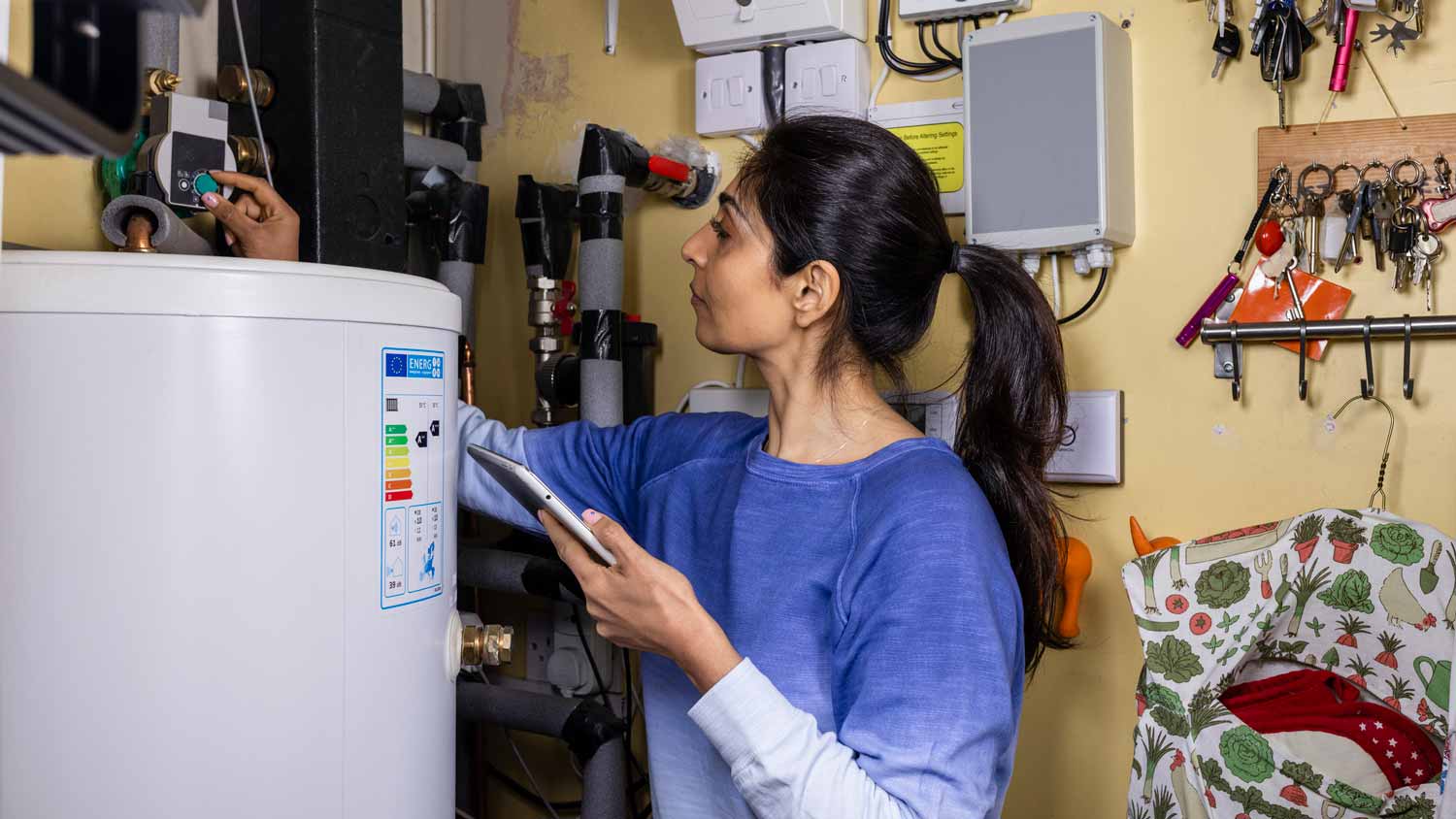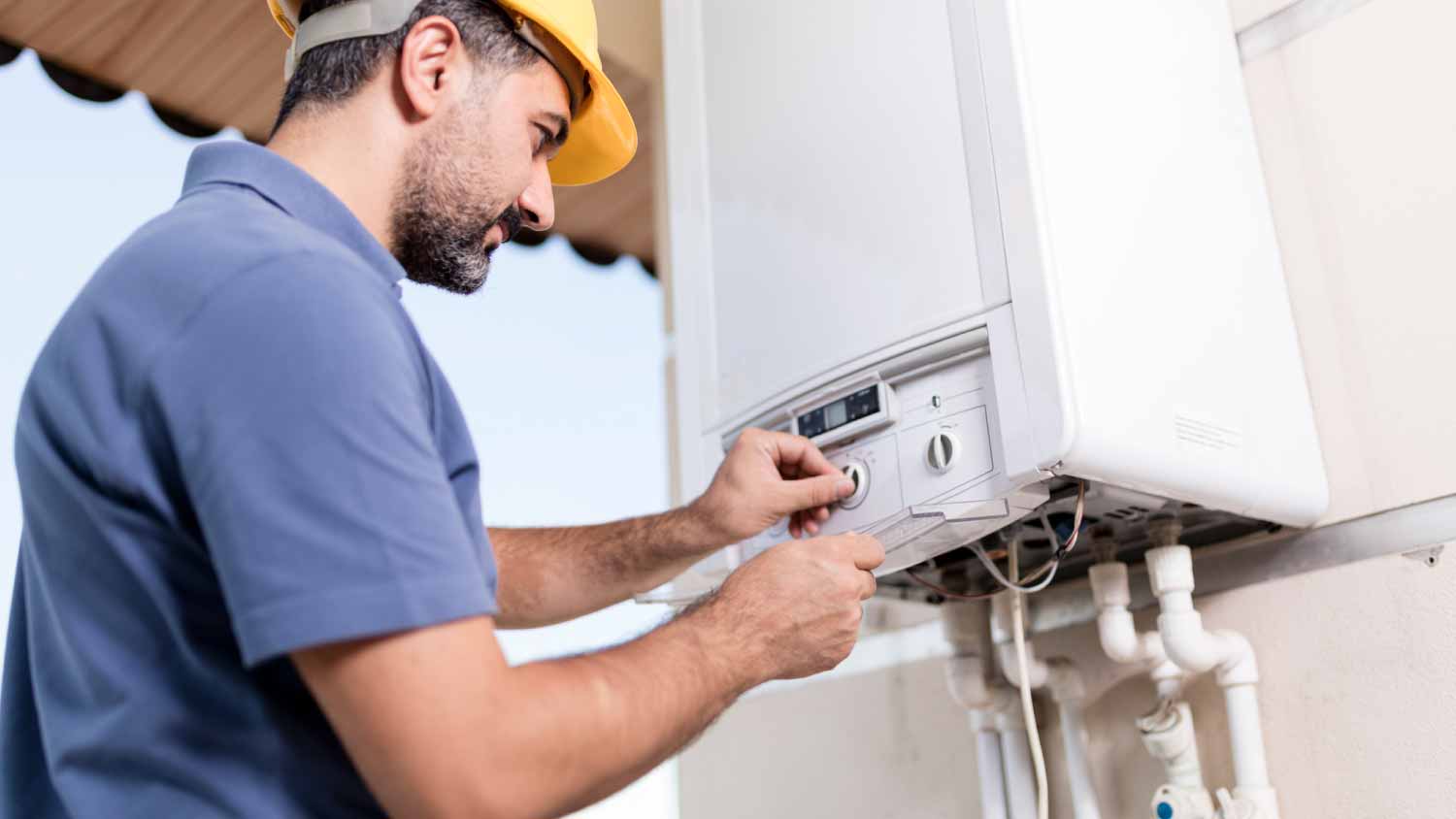Can You Still Use Water if Your Water Heater Is Leaking?
You can use water if your water heater is leaking—but brace yourself for the cold


Turn off your hot water as soon as you discover the leak.
A small leak can lead to big damage if you don’t fix it in time.
On average, water heater repairs cost about $600.
As long as you’re OK with cold water, you may be able to use water while it’s leaking.
A leaky water heater doesn’t have to stop you from running water as long as you’re OK with a cold shower—and have already scheduled a plumber to resolve the leak. But, if you run too much water or wait too long to get a repair, you could end up with some pretty costly (and sometimes even dangerous) damage to deal with.
Keep reading to learn more about why you should take a leak seriously and what to do if you have one.
The Dangers of Using a Water Heater That Is Leaking
Properly maintained, a hot water heater can last up to 10 years. But if you skipped your last one (or three) years of maintenance, a leak can happen. And when it does, it’s important to stop the drip before it turns into a flowing, dangerous mess.
If handled incorrectly, or simply not at all, running water through a leaking water heater can lead to:
Flooding: Water can end up flooding the room if you use it too much while it’s leaking or don’t schedule a repair in time, leading to thousands of dollars in extra damages.
Gas leak: The leak may be caused by a broken line or other component and lead to other issues, like a gas leak.
Fire or explosion: If there is a gas leak, your home is primed for another disaster—fire. Do not wait to check out your leaking water heater to prevent further damage.
Scalding: Your water heater may overcompensate for the leak and produce extra-hot water, which could lead to burns.
Electric issues: If you notice your water heater keeps tripping your breaker, it could be a sign that the leak is touching your electrical lines. If this is the case, you’ll need to contact both a plumber and an electrician.
Reasons Why Your Water Heater Is Leaking
There are many reasons why water heaters can start leaking. Determining the root cause of a leak can be helpful for properly diagnosing and fixing the issue. If you've noticed that your water heater is leaking, the cause is likely one of these things:
Damaged or failing pressure relief valve
Cracked water tank
Corroded water tank
Loose fittings or pipe connections
Worn anode rod
Sediment buildup
Loose seal on the drain valve
The location of your leak can often be helpful in figuring out the leak's origins. For example, water leaking from the top of the water heater often indicates that loose connections are affecting the cold and hot water inlets. Side leaks are often associated with faulty temperature pressure relief valves. Meanwhile, bottom leaks are often tied to faulty drain valves.
Can You Still Use the Cold Water?
If the leak stops when you turn off the water to your hot water tank, you can still use running water for things like showering, washing the dishes, or running your washing machine. However, you should brace yourself—this water will be cold. It also may not have as strong of pressure as you’re used to.
But if the leak doesn’t stop when you turn off the water, you should avoid running water until you can get a professional opinion.
What Should You Do if Your Water Heater Is Leaking?

1. Check If It’s a Leak or Condensation
A puddle at the bottom of your water heater could just be condensation. To tell the difference, look for active dripping coming from your heater. Common leak points like pressure-relief valves or where the pipes connect to the tank are good places to check.
2. Turn Off the Water
Once you’re sure it’s a leak (even if you can’t find the actual source), turn off the water to your water heater. This will help prevent further damage.
3. Turn Off the Heater
You don’t want to work on your water heater when it’s running, regardless of whether it’s a gas or electric water heater.
For a gas heater, turn the knob to the “pilot” setting.
For an electric heater, switch off power to your unit via your breaker box.
4. Drain the Tank
For the safety of your home and your appliance, drain your water heater after it’s turned off.
5. Contact a Plumber
For peace of mind, contact a local pro for an inspection to get an accurate idea of the scope of the issue. In addition to providing an inspection that identifies reasons the hot water heater leaking, a pro may be able to offer a same-day repair or replacement that allows you to get back to normal. Having a leaking water heater looked at by a professional is smart, even if you plan to possibly handle the repair on your own.
Once you’ve completed these steps, you’re ready to start safely working on the leak. Now, the question is whether you should do it yourself or hire a pro.
DIY Fixing a Water Heater Leak vs. Hiring a Pro
Some leaks and water heater problems are relatively easy to fix on your own with nothing more than a wrench, especially if it’s just a loose connection. But if you can’t find the source of the leak or it’s located within the temperature or pressure relief valve, hiring a local water heater contractor is the best course of action. Messing with any electrical or safety components of your water heater should be left to experts.
If you do hire a professional, expect to spend about $600. While this number may seem high, it’s important to remember that a new system costs upward of $3,500, so you’d still save a lot out of pocket by bringing in a professional.
If left untreated, a leaking hot water heater can lead to much more expensive damage than just the cost to repair a water heater, like mold remediation, foundation repair, electrical damage, and more—so don’t wait to get help if you don’t feel confident in your DIY ability for this task.
Questions to Ask the Water Heater Pro
With leaks having the ability to quickly spiral into major disasters in your home, calling a water heater pro at the first sign of water is wise. What should you be asking once you place the call? This rundown of core questions will ensure that you're giving and getting the right information:
Do you offer emergency water heater services?
Do you have replacement parts on hand during service calls?
Is your company licensed and insured?
How many years of experience do you have?
Do you work on gas, electric, or all types of water heaters?
Can you provide me with a quote before you come out?
While you may be in a rush to get the issue fixed, there's no need to rush to select the right pro. Only select a plumber with the credentials and experience to work on the type of water heater that's in your home. Homeowners should reach out to multiple local pros for quotes to ensure they can find the right plumber for the job.
Frequently Asked Questions
A leaking water heater could potentially last for a few weeks or months before you need to repair it. However, it's not advisable to wait too long. Once your water heater starts leaking, it's likely that the underlying cause of the leak is getting worse as time goes on. Without immediate repair, your water heater could fail. Instead of using a leaky water heater, you should turn it off and call a pro to fix it.
Yes, a leaking water heater can burst, especially if the leak is due to internal corrosion or a failing tank. The longer it goes unaddressed, the higher the risk of a sudden rupture, which could lead to significant water damage in your home. That’s why it’s critical to address leaks as soon as you notice them.
Yes, a leaking water heater can damage electrical work. Water can seep into electrical components, causing short circuits, tripped breakers, or even fires. The combination of water and electricity is quite hazardous, so it's crucial to address any leaks immediately to prevent electrical damage and ensure your home’s safety.





- 6 Signs Of Water Heater Failure
- Water Heater Inspection Checklists: What You Should Know
- How to Spot a Frozen Water Heater and Fix Frosted Plumbing
- 6 Signs Your Water Heater Might Explode
- Why the Water Heater Keeps Tripping Breaker
- How to Size a Water Heater
- Water Heater Installation Code Requirements and Violations You Should Know
- 10 Most Common Plumbing Problems Every Homeowner Should Know
- What to Do if Your Tankless Water Heater Freezes
- How to Troubleshoot and Fix a Ceiling Leak










